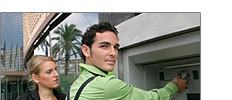How to Balance a Checkbook
Knowing how to balance and manage a checkbook is an important part of managing your money. Part of opening a student checking account is being responsible enough to keep track of your expenses and save for your future.
You need to know how much money is in your account so you don't bounce a check or overcharge purchases on your debit card. By using a checkbook register to record your transactions, you can cross-check your information with the bank's information and find out where a mistake might have been made.
Why should I Balance my Checkbook?
It may seem like a tedious task to balance your checkbook, but it's an absolute necessary element of managing your money wisely.
Here are a few reasons why you should know how to manage a checkbook:
- You can cross-check your calculations with the bank statement to see if they made a mistake.
- You might find an error in your checkbook register.
- You'll know exactly where to look if you have to recheck your records.
What do I need to Balance my Checkbook?
Before you start to start to balance your checkbook, you should have the following:
- Copy of your bank statement
- Calculator
- ATM cash withdrawal and deposit slips
- Copies of written or deposited checks
- Any returned checks
- Electronic fund transfer verification
- Online and offline debit card payments and purchases
- Any earned interest in your checking account
- Bank charge fees
Once you have all of these items, along with your checkbook register and a pen or pencil, then you're ready to balance your checkbook.
How do I Balance my Checkbook?
When you receive your bank statement it should have a form on the back for you to balance your checkbook on your own. You can either use that form or just a scrap sheet of paper.
Using the form or a sheet of paper, follow these steps:
- Divide your paperwork proof into deposit piles and withdrawal piles.
- Write your bank balance on line 1.
- Compare all of your deposits against the bank statement. Record any deposits that are still in transit and have not yet been processed. Write this on line 2.
- Compare the total withdrawals against the bank statement. Record any "outstanding" unprocessed checks that are still in transit and have not yet cleared with the bank. Write this on line 3.
- Add lines 1-3 to find out your total checking account balance. It may be different from the bank statement because the bank might not have processed all transactions. The final number will be your adjusted bank balance. Write this on line 4.
- Check to see if you were charged any bank fees, and subtract this from the bank balance. Add any incurred interest to the balance. Finally, check to see if all transfers that you made have been processed. Add or subtract this amount from the adjusted balance, and you will have your ending bank balance on line 5.
Hopefully your balance and your bank statement will match. If they don't, then go back and double check all of your numbers. It's most likely that you made a math error, so it doesn't hurt to know where the mistake was made.
If you still don't agree with your calculations and the bank's, then you can always contact a bank representative for help. They will be happy to offer you assistance with your account.
Unless you're a numbers genius and can keep track of money amounts in your head, you really should know how to balance a checkbook. You need to keep track of your hard-earned money so you can properly invest it in the future. Plus, it's just good to know how much money you actually have in the bank.







